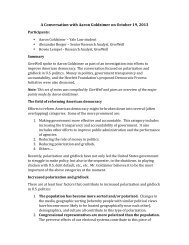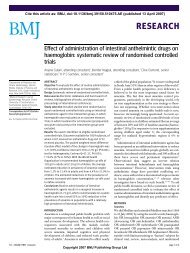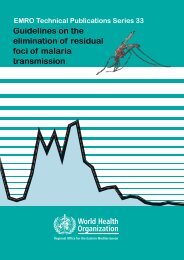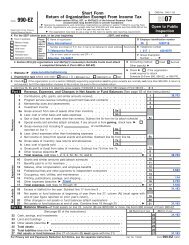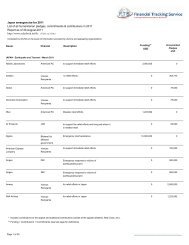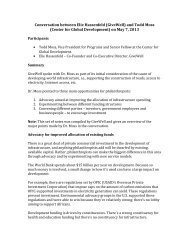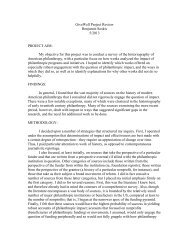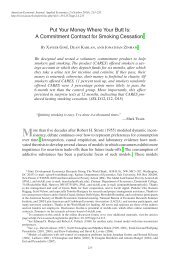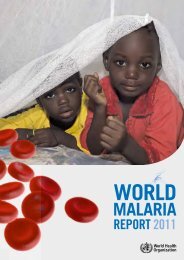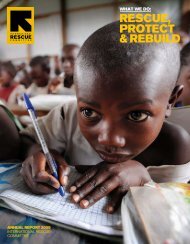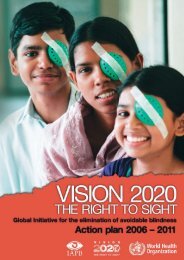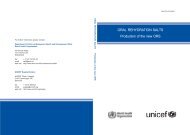Annual Report 2005 - Doctors Without Borders
Annual Report 2005 - Doctors Without Borders
Annual Report 2005 - Doctors Without Borders
Create successful ePaper yourself
Turn your PDF publications into a flip-book with our unique Google optimized e-Paper software.
16<strong>Doctors</strong> <strong>Without</strong> borders/MÉdecins sans frontiÈres (MSF)EcuadorIn the city ofGuayaquil, MSFprovides HIV/AIDStreatment.© Juan Carlos Tomasiand in the Bogotá capital district. MSF alsoprovided basic health care to people livingin Soacha district near Bogotá, wherethousands of Colombia’s displaced arriveeach year. In the western city of Quibdó, inChocó department, Colombia’s poorestregion, MSF teams supported two healthcenters in the shantytowns of Porvenir andRepos as well as a large hospital center,Ismael Roldan, and the maternity ward ofSan Francisco Regional Hospital.CONGO REPUBLIC $100,000International staff: 25 National staff: 223Destroyed infrastructure anda lack of careIn the Pool region, MSF helped people livingwith HIV/AIDS, tuberculosis, malaria, wartrauma, and sexually transmitted infectionsat hospitals in Kinkala and Kindamba. InMindouli district, MSF staff offered basichealth care in the local hospital and in fivearea health centers, and ran mobile clinicsthroughout the region. MSF continued atreatment program for sleeping sickness inthe areas of Mossaka in the Cuvette Est region(on the Congo River) and in Nkayi in theBouenza region in the south of the country.DEMOCRATIC REPUBLICOF CONGO $6,030,525International staff: 223 National staff: 2,133Seeking to meet massivehumanitarian needsMSF runs one of its largest aid operationsin the Democratic Republic of Congo(DRC). Teams work in 26 locations acrossthe provinces of Kinshasa, Equateur,Orientale, North Kivu, South Kivu, andKatanga. Over the past year, MSF respondedto cholera epidemics near Gomaand Beni, and to massive displacementsof people due to fighting aroundKanyabayonga in North Kivu. A 10-dayabduction of two MSF staff members inJune <strong>2005</strong> forced the organization to endits assistance programs to more than100,000 displaced persons living in campsnear Lake Albert in the northeastern Ituriregion. MSF continued to operate a 150-bed emergency hospital in Bunia, one ofthe Ituri region’s largest towns. MSF alsoprovided care to more than 3,500 victimsof sexual violence in the towns of Bunia,Beni, Rutshuru, and Kayna. In the capitalcity of Kinshasa, in the west, and in Bukavu,South Kivu province, in the east, MSFprovided antiretroviral treatment to1,800 people living with HIV/AIDS. MSFmaintained emergency teams on standbyin Kinshasa, Kisangani, Lubumbashi, andMbandaka to confront sudden crises suchas outbreaks of measles, whooping cough,plague, or cholera.ECUADOR $195,525International staff: 13 National staff: 21Expanding treatment of HIV/AIDSMSF ran an HIV/AIDS project in westernGuayas province, treating approximately330 patients, of whom more than 90received antiretroviral (ARV) medicines. Inaddition, MSF urged the government touse and to facilitate the registration ofless expensive generic medicines insteadof costly brand-name ARVs.ETHIOPIA $800,000International staff: 55 National staff: 721Addressing staggeringmedical needsIn Galaha, in the northeastern Afar region,MSF admitted 40 patients each month toits tuberculosis-treatment program adaptedto the needs of the semi-nomadic peopleInnovating Malnutrition TreatmentThe number of children affected by major outbreaks of acute malnutrition often far exceeds the capacity ofchallengeaid organizations to treat them in health structures.



